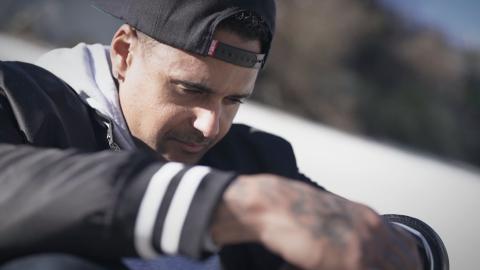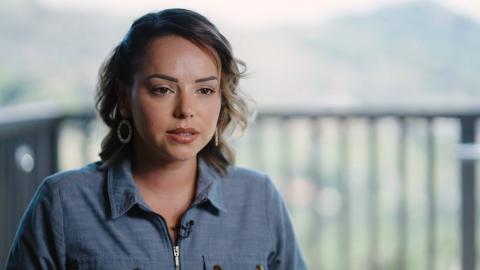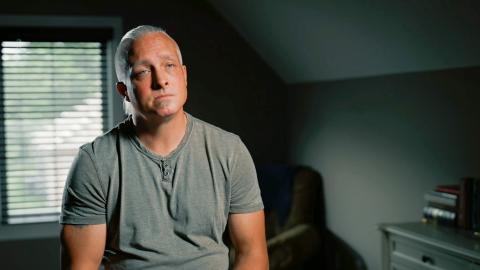Agonized by Shadows from the Job
For Michael, that meant going into law enforcement.
“As a little boy, I would play with my little cars and pretend to be a police officers because I just, um, held that uh profession uh with honor.”
So after graduating high school in June of 2000, he joined the Marines.
“My goal was to be an MP. And of course, like anything else, you go into boot-camp and they tell you got this job, and then it didn't work out that way because it's-it's filled up. So I ended up working for the adjutant's office."
In his time as a Marine he married Laketa and had two children. Then, after 4 years of honorable services. He left the Marines and enrolled in the Virginia State Police Academy. After graduating, he reported for duty in Springfield, VA.
“You know, it was - it was exciting. You know, I was prepared to-to just come out there and serve people, you know. Um to be able to meet people at where they're at in their worst time of need, to help to helpless, to-to-to encourage those who are discouraged, you know.”
Three months into his career, Michael responded to a gruesome, fatal car accident.
“You know, I-I realized it affected me, but I didn't know how deep. In law enforcement, they'd say, keep work at work and home at home, and you don't want to bring that bear – that burden to your family."
That was only the first of hundreds of tragic scenes Michael would witness as a first responder. And over the next few years, the emotional stress started taking a toll.
“I would suppress those feelings. And it kinda, in a sense, you become numb to the pain. And if I could be honest, um because of suppression, you stop feeling, you stop feeling."
Then, in 2013, Michael became a police chaplain and joined the honor guard. Now he was not just first on the scene, it was his job to inform and comfort the families of victims.
“I'll tell you, one of the worst things you will ever do in this profession and deal with is doing death notifications, man. You'll never forget that moment when you walked into their house and gave him this devastating, devastating news."
Even harder, was having to attend the funerals of fallen officers – some who were friends.
“Carrying these officers and these troopers, caskets, to honor their service with thousands of people walking behind us, um as their family mourn. And just listening to the weeping, it's heavy. But at the same time it's honorable."
Eventually, the stress and trauma started affecting Michael’s relationship with his wife and children.
“My heart was-was hard because of the trauma. I remember one day my-my daughter said to me, she said, 'Dad, sometimes I feel like I don't even know you.' And it crushed me."
Near the end of 2015, Michael experienced a string of deaths closer to home. One of them was a co-worker's wife who had been abducted and killed.
It would only take a routine fender-bender to send him over the edge.
“And I remember sitting my car and tears start rolling down my eyes and it was just anger. And at that point I knew, I was like, yeah, I have nothing else to give, man. The passion - the passion um, it went away. It was - it was pain. It was pain from a trauma, um what I experienced, and what I was witnessing. At the same time, the pain of-of watching these men and women that wear a uniform, life be taken."
Nightmares soon followed, and in 2015 Michael took a leave of absence and went into counseling, where he was diagnosed with PTSD. But after 6 months, the pain and nightmares still tortured him.
“I wanted those nightmares to go away. Cause every time I closed my eyes, every fatal crash, every fatality, every death experience I've ever experienced in my career all came back. And for me, you know, I-I-I-I thought about it. I thought about, ended my life. It wasn't that I wanted to die. Not at all. I love Jesus. I love my family. It was just, I just wanted the pain to go away."
One night in July of 2016, Michael had but one place to turn.
“I woke up crying because of those dreams and those nightmares. I went into my closet, closed the door, got on my knees, lay prostrate on the floor and begin to weep and cry, begging for the Lord to release the burden off my shoulders." He said, "Son, let it go. I got it. Give it to Me. I'll take it. You don't have to carry that burden anymore."
And that’s what Michael did.
“That pain was given to the Lord, gave it to Him. I said, 'It's all You, Lord.' And He said, 'Michael, what are you going to do with it?' I said, 'I'm gonna make it known. I'm not being silenced anymore.'"
So after rejoining the Virginia State Police and restoring his relationship with his wife and children, Michael became a speaker for Blue H.E.L.P. and First Responders' Bridge, two organizations who help law enforcement officers and all first responders cope with the stress of trauma and PTSD.
"It's okay to-to let your guard down. It's okay not to carry the weight on your shoulders. It's okay to talk about those dark things. It's okay, cause that's the only way you can heal. So that's been my passion ever since my experience, that's been my motivation uh since my experience."
And of all his experiences as an officer, there’s one he remembers most of all.
“And in that closet, I can tell you, as the Lord released a burden off my shoulders, He touched me. He strengthened me and He lifted me up."



